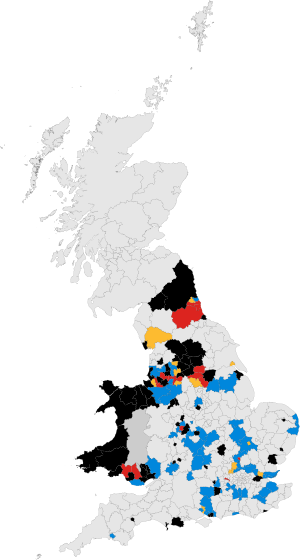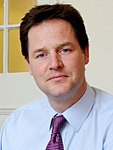United Kingdom local election, 2008
|
|
|||||||||||||||||||||||||||||||||||||||||||||||||
|---|---|---|---|---|---|---|---|---|---|---|---|---|---|---|---|---|---|---|---|---|---|---|---|---|---|---|---|---|---|---|---|---|---|---|---|---|---|---|---|---|---|---|---|---|---|---|---|---|---|
|
|||||||||||||||||||||||||||||||||||||||||||||||||
|
137 English Local Authorities and all Welsh Councils |
|||||||||||||||||||||||||||||||||||||||||||||||||
|
|||||||||||||||||||||||||||||||||||||||||||||||||

Colours denote the winning party, as shown in the main table of results.
|
|||||||||||||||||||||||||||||||||||||||||||||||||
The 2008 United Kingdom local elections were held on 1 May 2008. These elections took place in 137 English Local Authorities and all Welsh Councils.
There were also extraordinary elections held for four of the new unitary authorities being created, in Northumberland, County Durham and Cheshire (two councils - Cheshire East and Cheshire West and Chester). Scheduled elections for Penwith in Cornwall, Shrewsbury & Atcham in Shropshire, Bedford and South Bedfordshire in Bedfordshire and five district councils in Cheshire were cancelled, due to the up-coming unitary authorities being established in those counties.
The Labour Party finished in 3rd place, trailing the Conservatives by 20%, the largest such margin ever between the two main parties. Aside from the strong showing for David Cameron's Conservatives, the BNP also made substantial gains, making 10 net gains to finish with over 30 seats.
The strong showing for the Conservatives and the disappointing showing by Labour reflected the change in the political mood of Britain at the time, where the Labour government, now led by prime minister Gordon Brown, had suffered a slump in popularity due to the financial crisis and economic fears which were affecting Britain at the time.
All 36 English metropolitan borough councils had one third of their seats up for election.
...
Wikipedia



